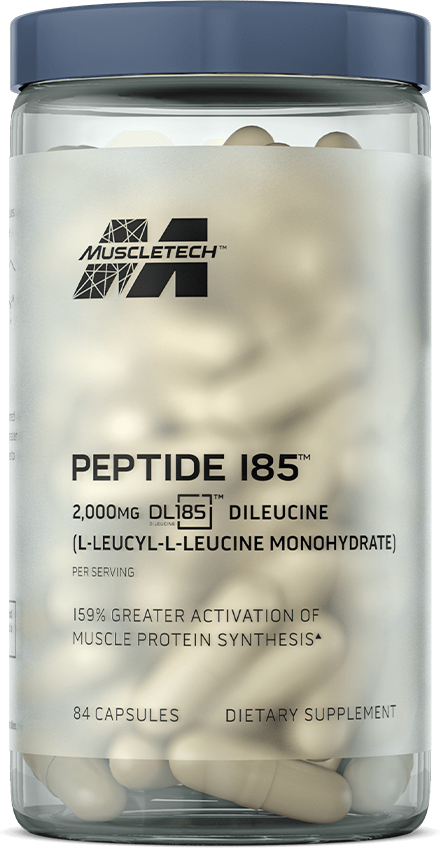
For Episode #123, PricePlow welcomes guests Raza Bashir of MuscleTech and Shawn Wells of NNB Nutrition and Ingenious Ingredients back on to the PricePlow Podcast to discuss MuscleTech’s new muscle-building supplement, Peptide 185 (pronounced “Peptide One-Eight-Five”), which is made from a new leucine dipeptide (dileucine).
Raza Bashir of MuscleTech and Shawn Wells of Ingenious Ingredients join the PricePlow Podcast for Episode #123 to discuss the new dileucine ingredient in Peptide 185!
Launched in early 2024, the powerful amino acid has repeatedly sold out on MuscleTech’s website, but when it’s been available, we’ve received countless inquiries about it, so we worked to get this episode live to help answer many of the most frequently asked questions.
Raza and Shawn both also appeared on Episode #072, where they explained paraxanthine enfinity to the world. After we finish discussing the dileucine in Peptide 185, we recap the key takeaways and experiences from the enfinity introduction, learning about new data coming.
Interestingly, we’re told that the two ingredients are synergistic, so we hope to see more about that in the coming years.
0:00 – Re-Introductions
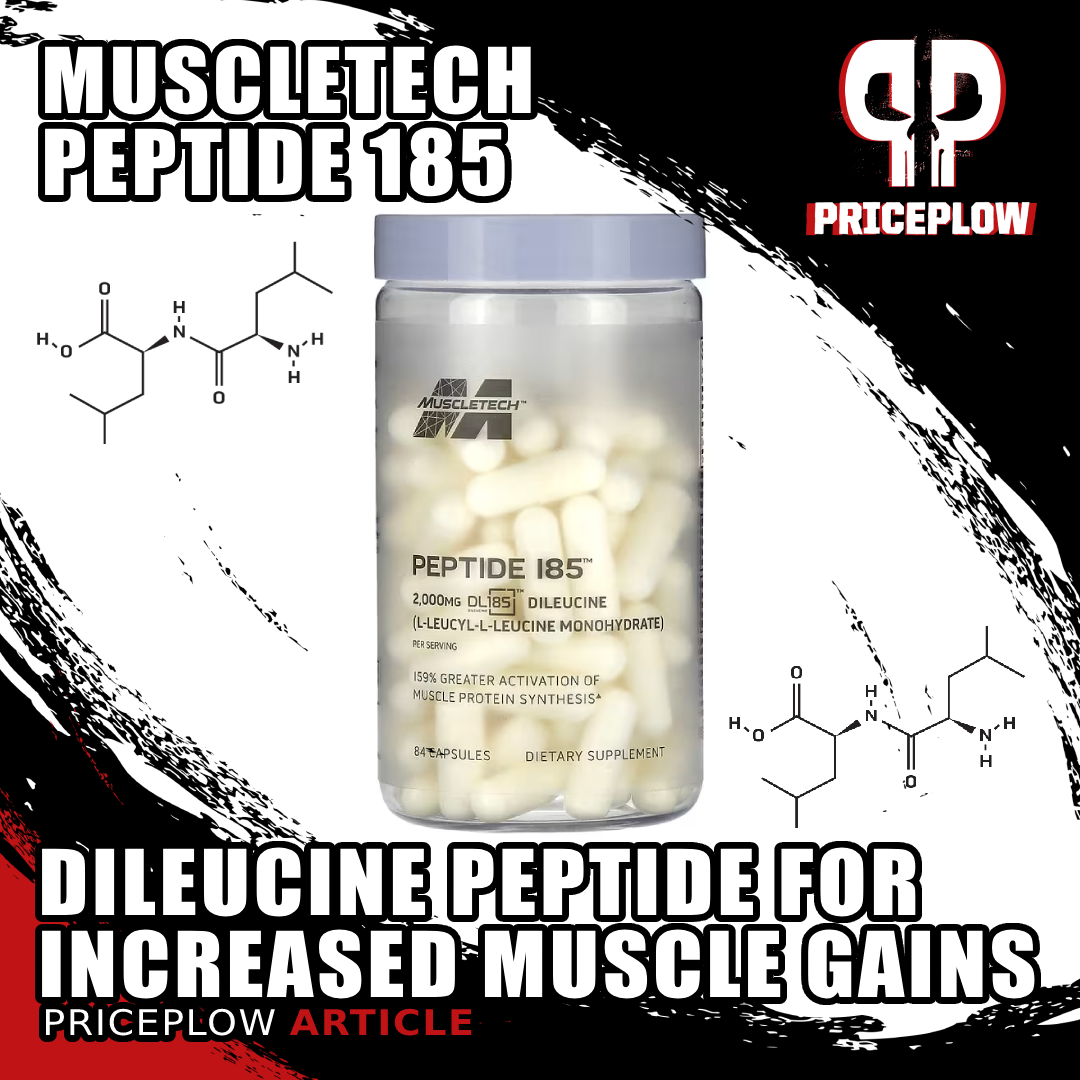
Each 3-capsule serving of MuscleTech Peptide 185 has 2 grams of dileucine!
Raza highlights the excitement around peptides in the industry and MuscleTech’s focus on creating compliant dietary supplements with strong scientific backing. He explains Peptide 185‘s uniqueness, emphasizing its component, dileucine (two leucine molecules bound together), and its unprecedented nature in the market. The product’s name reflects the 185% faster uptake due to the body’s specialized peptide transporters.
Raza shares impressive findings from research on muscle protein synthesis and strength gains, though the study is not yet published. Shawn adds depth to the conversation, discussing his 12-year work on peptides and their preferential absorption through the PepT1 transporter. He explains the importance of leucine for muscle protein synthesis and introduces the concept of leucine resistance, particularly in older individuals.
Shawn’s interest in dileucine arose from its potential to enhance muscle protein synthesis more effectively than leucine alone, a hypothesis confirmed by preliminary studies. He notes that trileucine was less effective, leading to their focus on dileucine.
Note: Peptide 185 is pronounced “Peptide One-Eight-Five”.
10:45 – Defeating Leucine’s Limitations with Dileucine
The group discusses the limitations of consuming large amounts of leucine for muscle protein synthesis and the benefits of dileucine. Mike questions why not just consume lots of leucine, but Shawn explains that even large doses of leucine cannot match the effect of dileucine. Intriguingly, Shawn reveals that leucine administration can yield dileucine, suggesting a possible reevaluation of what actually triggers muscle protein synthesis.
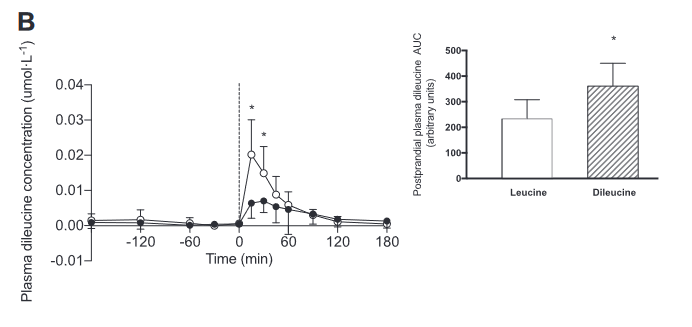
Compared to oral leucine supplementation, oral dileucine supplementation increased serum dileucine concentration more effectively.[1]
Raza mentions the historical use of Leukic, a leucine-rich supplement, and notes the advantage of a separate transporter for peptides like dileucine, which leads to better results. When discussing results, Raza emphasizes MuscleTech’s focus on muscle, strength, and overall physical health performance.
Regarding dileucine dosing strategy, they recommend taking it post-workout to amplify muscle protein synthesis and in the morning on rest days. Shawn adds that dileucine enhances protein effectiveness, and recent data suggest there’s no upper limit to beneficial protein intake.
As a note, we first learned about dileucine from Dr. Ralf Jaeger in Episode #078, where he explained the phenomenon that the body goes out of its way to form dileucine — and being that the body is generally “lazy” and doesn’t do that kind of work unless it’s for a very good reason, this is of biological importance.
19:00 – Dileucine Dosage
Mike, Shawn, and Raza discuss the optimal dosing for dileucine and its potential benefits. Shawn explains that the recommended two grams dose was decided upon based on extrapolation from animal data, emphasizing the need for further research. He suggests that instead of increasing the single dose amount, taking two grams multiple times a day could be more effective.
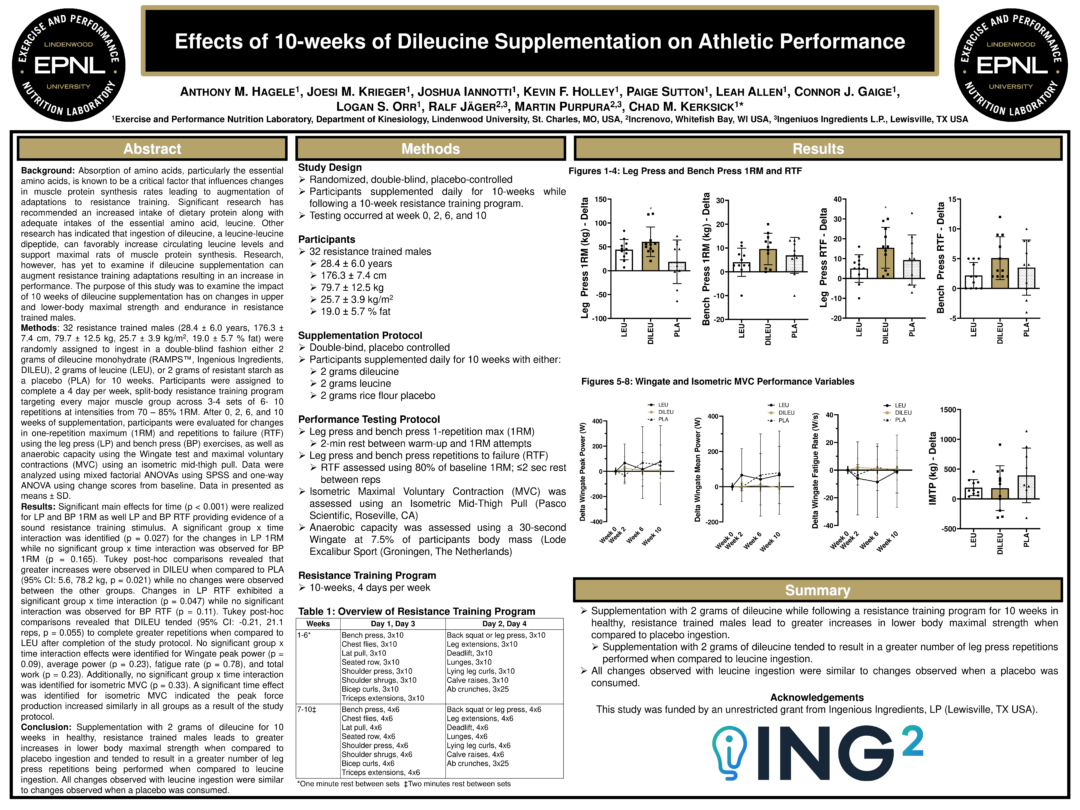
Effects of 10-weeks of Dileucine supplementation on athletic performance[2]
Raza shares his personal experience with dileucine, noting significant strength benefits and improved gym performance, attributing these gains to the supplement. Mike then inquires about the effectiveness of dileucine for those using steroids, wondering if it is more beneficial for natural athletes. Shawn responds that dileucine can be a great equalizer, particularly for older individuals facing leucine resistance, and suggests that natural athletes could see significant benefits when combining dileucine with other supplements like creatine (see MuscleTech Platinum 100% Creatine) and Clear Muscle.
25:45 – Dileucine Benefits and Market Readiness
The team then discusses the potential benefits of dileucine for a wide range of individuals, including those on testosterone replacement therapy (TRT) or other supplements. They emphasize that amino acids are essential regardless of one’s supplement regime, and dileucine could be beneficial even for individuals with elevated testosterone levels.
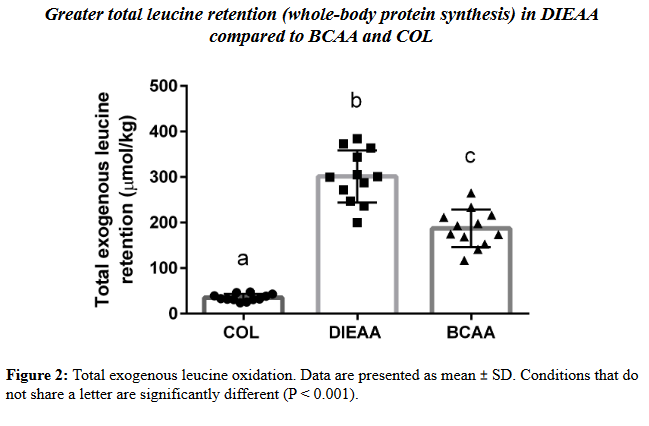
In this study, the dileucine + EAA group showed vastly greater leucine retention than either BCAA or COL.[3] More images are shown in our main Peptide 185 article
The discussion then shifts to the compliance and market readiness of dileucine. Shawn explains that dileucine is considered an amino acid regulatorily and has been shown to occur naturally in hydrolyzed proteins like collagen and whey. They ensured that it’s 100% compliant and safe for use in food and beverages. Raza adds the importance of market-specific regulatory checks.
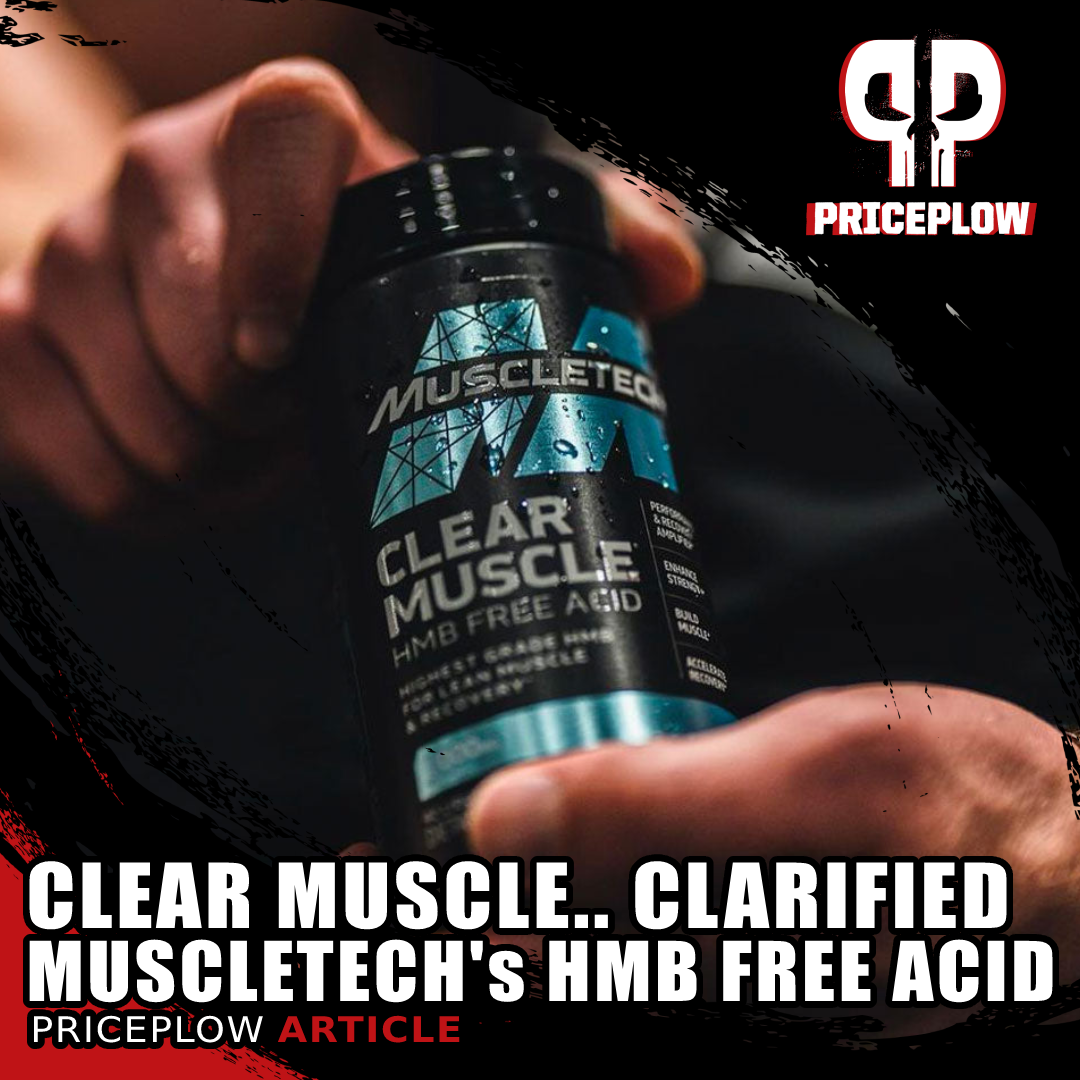
What is MuscleTech’s Clear Muscle? It’s a muscle health supplement using BetaTOR (HMB Free Acid) and some betaine to get you back into the gains territory after super hard training!
Mike then inquires about optimal supplement stacks, and Raza suggests a combination of dileucine for anabolic signaling, Clear Muscle for preventing protein breakdown (Clear Muscle is HMB free acid linked above – also see our article on HMB), and creatine for ATP and muscle performance. He also mentions promising research combining dileucine with essential amino acids, showing unprecedented results in muscle protein synthesis, more than seven times higher than BCAAs and leucine. This highlights the potential of dileucine to enhance training responses and overcome plateaus.
32:15 – Dileucine and Paraxanthine
Mike, Raza, and Shawn discuss the timing and synergy of various supplements, including dileucine and Clear Muscle (free acid HMB). Raza shares his personal supplement routine, taking dileucine either in the morning or post-workout and Clear Muscle HMB in between meals.
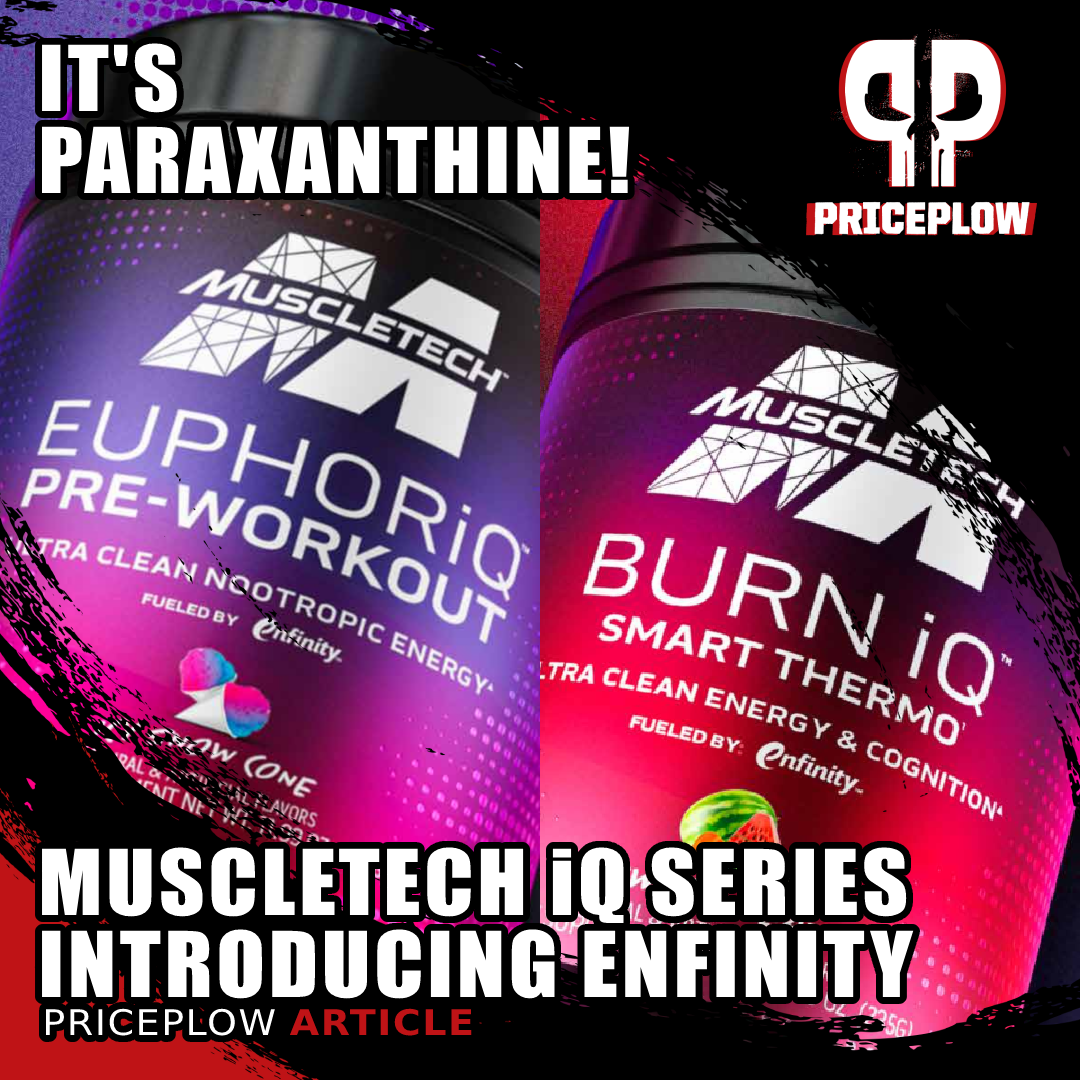
MuscleTech has revealed their new iQ Series of supplements, and it will include a new stimulant — paraxanthine — named enfinity. Learn how this lineup will forever revolutionize the entire energy industry
Shawn then introduces exciting research about dileucine’s synergy with other sports nutrition ingredients, highlighting paraxanthine as the top synergist for endurance and performance in a preclinical study. He also mentions potential cognitive effects of mTOR pathways, traditionally associated with muscle but possibly relevant for brain health.
enfinity paraxanthine was of course introduced to the world with MuscleTech’s iQ Series, and you can head back to episode #072 to listen to Shawn and Raza explain it in detail.
The discussion then delves into user feedback on MuscleTech’s EuphoriQ pre-workout, which includes paraxanthine as its energy source. Raza reports positive reception and unique advantages for users seeking non-intensive stimulants. Shawn elaborates on the unique benefits of paraxanthine, contrasting it with caffeine and highlighting its effects on nitric oxide, BDNF, and brain aging markers. He emphasizes the potential of these supplements for older populations based on preliminary data and anecdotal feedback.
41:30 – The Benefits of Paraxanthine
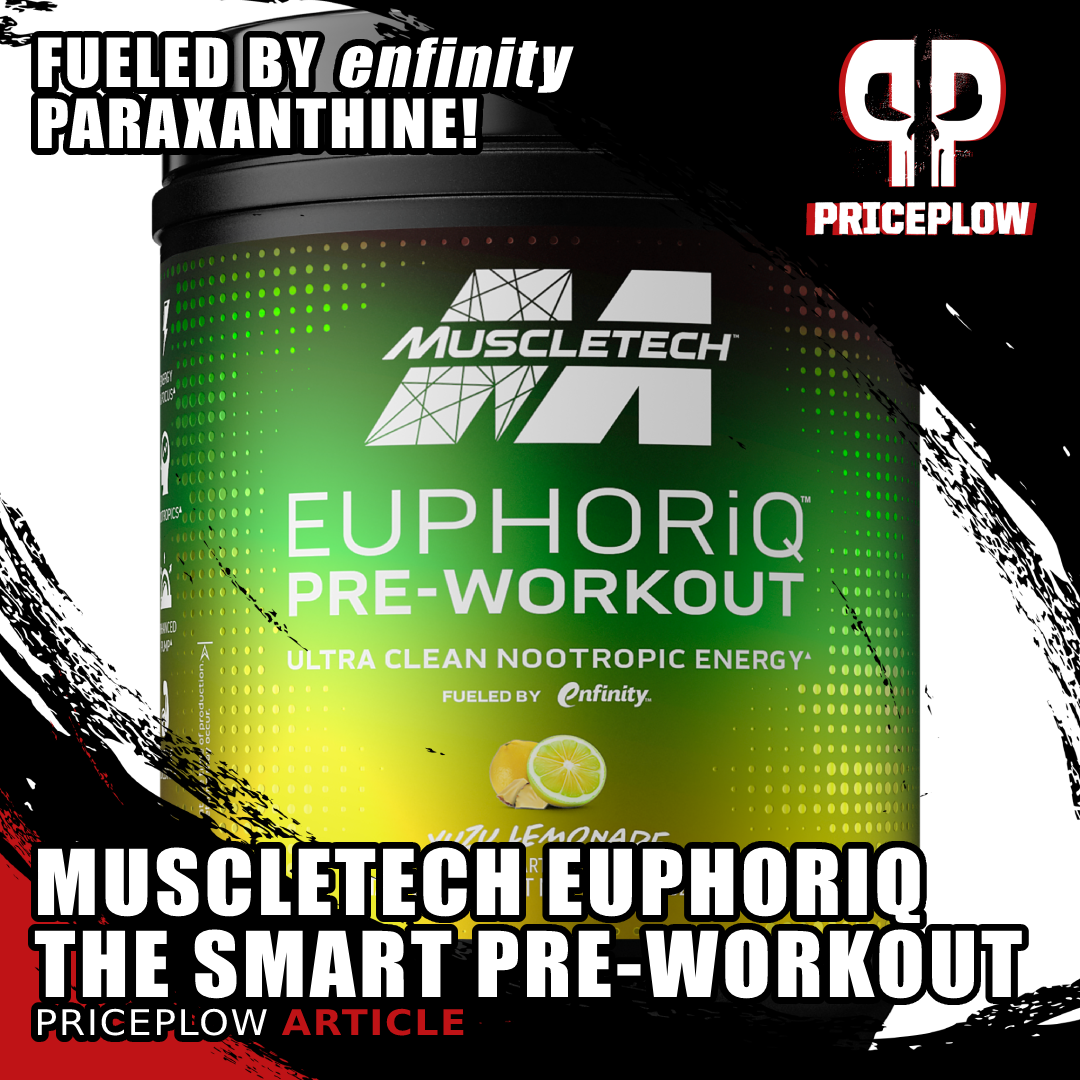
MuscleTech EuphoriQ is the smarter pre-workout supplement – an enfinity-powered nootropic pre-workout supplement that harnesses paraxanthine instead of caffeine!
Shawn recaps the unique benefits of paraxanthine compared to caffeine and its metabolites, such as theophylline. Ben, a caffeine lover, inquires whether the negative effects of caffeine’s metabolites overshadow the benefits that paraxanthine could offer. Shawn agrees, noting that other metabolites of caffeine, like theophylline, have significant side effects.
Raza adds that the trend is moving towards lower caffeine doses, and paraxanthine offers a cleaner, more efficient alternative. He also notes that the dose of paraxanthine in MuscleTech’s EuphoriQ is effective without the negatives of high caffeine doses. Shawn emphasizes the importance of understanding individual differences in caffeine metabolism and their impact on performance.
Mike reflects on the audience they’ve cultivated around high-stimulant pre-workouts and acknowledges the broader market that might prefer lower-stimulant options. Shawn stresses the importance of careful marketing and dosage recommendations for paraxanthine to avoid negative associations and regulatory issues that have affected other stimulants in the industry.
53:45 – Leucine Resistance and Wrap-Up
Shawn talks about leucine resistance, also known as “anabolic resistance”, especially prevalent in older individuals, leading to muscle loss and increased fat gain. He suggests that supplements like HMB, creatine, and dileucine could be crucial in counteracting this, particularly in older adults. For more information on HMB, another great podcast is Episode #093 with Shawn Baier.
Raza notes the importance of these supplements for muscle vitality and quality of life, especially given the trend towards using weight loss drugs like GLP-1 agonists that can cause muscle loss. Shawn adds that berberine, a GLP-1 agonist, could be a beneficial addition to such a supplement stack.
The conversation concludes with Shawn expressing gratitude for the collaboration with MuscleTech and the ongoing work to bring innovative products to the market. Mike appreciates the continued introduction of novel ingredients, highlighting the evolution and excitement in the sports nutrition industry.
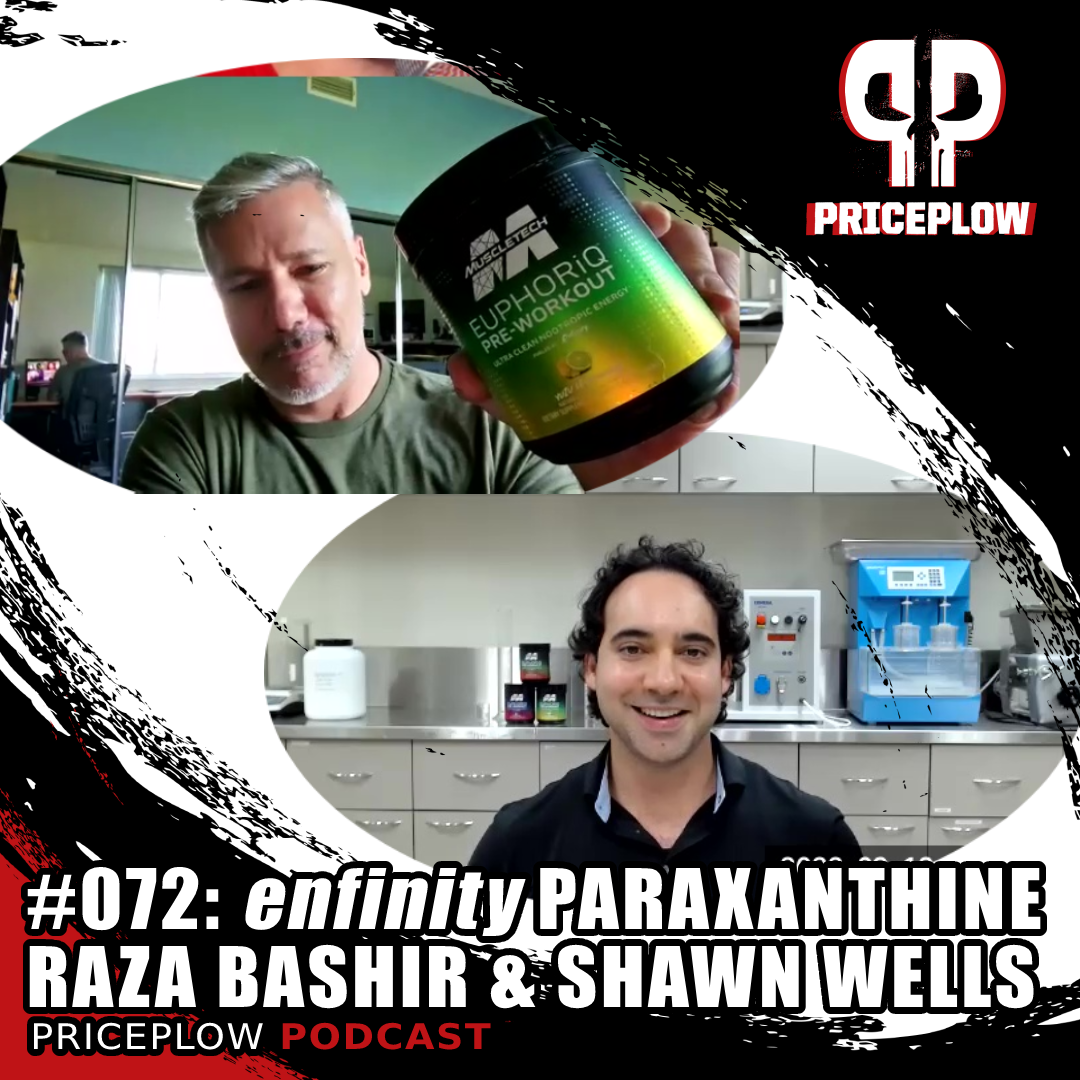
Earlier, MuscleTech’s Raza Bashir and Ingenious Ingredients (and NNB Nutrition CSO) Shawn Wells join the PricePlow Podcast for Episode #072 to talk about MuscleTech’s new iQ Series launch, using enfinity Paraxanthine!
Thanks once again to Shawn and Raza for supporting the PricePlow Podcast and coming on to discuss your new ingredients.
As always, subscribe to the PricePlow Podcast on your platform of choice, and leave us a 10-star review!

